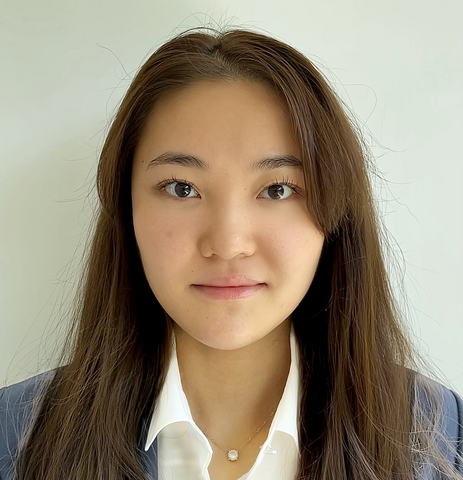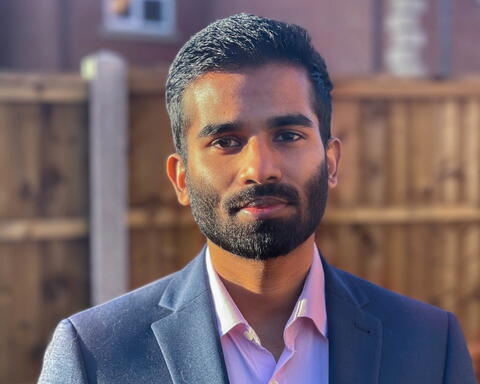
Published
Blog type
This September we were pleased to welcome in another impressive cohort to our Finance Master’s programmes who are set to become the finance industry’s next generation of leaders and innovators. Our new crop of motivated young up-and-comers are excited to begin their one-year journeys on the following programmes:
- MSc Finance
- MSc Finance & Accounting
- MSc Financial Technology
- MSc Investment & Wealth Management
- MSc Risk Management & Financial Engineering
A total of 610 students joined us across these five programmes, bringing with them a breadth of experience from a diverse range of backgrounds, with 67 nationalities represented across the cohort, and degree backgrounds that span from Economics (24%) to Finance/Accounting (23%) and Mathematics (24%).
Our Finance students will gain a wealth of experience in both quantitative and qualitative fields, helping them develop skills that will propel them into successful careers in corporate finance, investment banking, fintech, wealth management or any other area of finance.
Each programme is unique with their own set of core modules and programme elements, electives such as Entrepreneurial Finance, Real Estate Investment and Innovation and Strategy in FinTech are shared across the Finance suite, providing opportunities for students from all five programmes to study together. The Business School also hosts multiple events throughout the year offering many opportunities for students to mingle and socialise across programmes and build a wide-ranging finance network.
Students are also encouraged to make the most of the countless extra-curricular opportunities on offer, such as the Student Investment fund, which gives students the chance to gain real-world experience in buy-side investments, or the Finance Careers Club, which provides members a platform to build knowledge and skills; while encouraging them to explore their career ambitions across the financial sector, both in London and internationally.
Professor James Sefton, Academic Director, Finance Suite said:
As each academic year finishes, I like to ask students what they enjoyed most about the year. I receive many different responses but what I am told most frequently every year is ‘the friends I have made’. I am enormously pleased to think that, as Academic Director, I am contributing to creating an environment that enables real, special friendships to start.
MSc Finance
Ranked #11 in the world in the Financial Times Masters in Finance Ranking 2021, MSc Finance is our flagship finance programme. The programme is taught by leading faculty, who bring both industry experience and research expertise to deliver an advanced curriculum. Paired with personalised career support and ongoing relationships with major employers in the finance sector ensure that the MSc Finance equips students with practical experience and the confidence required to present themselves to the world’s top companies.
The programme also helps our MSc Finance students to obtain their Chartered Financial Analyst designation as a member of the CFA University Affiliation Program.
The class of 2021-22 is comprised of 88 students of 34 different nationalities. The students are very academic, with 68% possessing a first-class degree. Students from an Economics degree background make up 59% of the cohort, followed by Finance/Accounting (9%) and Business/Management (9%).
Meet MSc Finance students

Chrissy Au
Nationality: Hong Kongese/Irish
Education: Nanoscience, Trinity College, Dublin
What is your background prior to studying MSc Finance?
Having been born in Ireland and raised in Hong Kong, I have a multicultural background. Studying my undergraduate degree in nanoscience at Trinity College Dublin, I learned how to be an innovative researcher and a team player.
Following this I pursued an internship at Crown Agents Bank within the operations team. I further took the opportunity to intern at two hedge funds in Hong Kong as an investment intern.
What is your main motivation for studying MSc Finance?
I was in one of my nanoscience lectures when my professor told us a story about his friend. He is a material scientist in a big corporation where he wasn’t compensated nor awarded sufficiently for his lifetime’s work. This prompted me to explore and study finance to further prepare myself for future entrepreneurial endeavours. After pursuing a few internships in the industry, I came to the realisation that the financial industry creates and supports growth in a lot of other industries. Imperial’s MSc Finance strikes the perfect balance between theoretical and practical. I believe it will equip me with the essential coding skills and financial knowledge I need to kickstart my career in a sustainable manner.

Dylan Bilski
Nationality: American
Education: Economics, Bates College
What do you hope to achieve with the programme?
I see Imperial College Business School’s MSc Finance programme as the perfect platform to not only hone my financial skills, but also put me in the position to work in an international capacity. I’m hoping to use this programme to pivot into a career in either investment banking or consulting in London. I want to refine my financial modelling skills and really dig into finance theory to fully understand the foundations of financial concepts. I’m also hoping to make plenty of friends from this programme and utilise the diverse set of electives available to build towards my career goals.
What are you most looking forward to outside of your studies?
I’m looking forward to playing rugby for Imperial, building strong relationships with those in the programme, and exploring London and mainland Europe. I’m looking forward to getting to know the rest of my cohort more and building many memories with them. I’ve visited London before, but I’m ready to do all the touristy and local experiences all over again. I love to travel and am grateful to attend a programme that is in such close proximity to the many cultural hubs of Europe. As COVID restrictions ease, I’m looking forward to being able to experience each of these cities to the fullest.
MSc Finance & Accounting
Accredited by both ACCA and CIMA, the programme prepares students for careers in financial or professional services.
Boasting 174 students, the MSc Finance & Accounting programme is the largest of our Finance Masters’. An incredible 42 nationalities are represented in this class, with students predominantly drawn from China, France, India, Taiwan and the United Kingdom.
Students in this year’s cohort mainly come from either a Finance/Accounting background (45%), or Business/Management background (34%), and a small number of students also undertake this programme after studying in other areas such as Science/Medicine or Arts/Humanities.
Meet an MSc Finance & Accounting student

Asli Yigit Sert
Nationality: Turkish
Education: Management, Bilkent University
What is your main motivation for studying MSc Finance & Accounting?
Through this MSc programme, I would like to enhance my analytical skills. I will gain expertise in advanced quantitative financial topics (e.g. portfolio management, money market instruments, valuation) and learn using tools such as R for various applications in finance. I also want to acquire further skills in conducting research during the summer term with the research project so that I will be able to provide a strong conceptual and empirical basis for policymaking and have the expertise to provide high-quality models and tools. On top of these, with the help of the programme, I aim to gain a wider perspective, explore development areas, and find solutions for the finance world.
What are your future career plans?
I would like to continue pursuing my career in central banking or in other organisations that work for developing and ensuring societies’ welfare such as the World Bank, IFC, IMF, etc. I wish to be influential in financing public projects and programmes, conducting monetary policy, supporting policy reform, providing technical advice and analysis, managing financial risk, attracting and financing private/public sector investments. While working for a targeted institution of mine, I am also planning to apply for a PhD programme in finance. I value combining professional experience with research and academic skills.
MSc Financial Technology
Graduates of our MSc Financial Technology are provided with the skills to pursue a successful and exciting career in the ever evolving sector of fintech and beyond.
This year’s class of 91 students have the most diverse range of backgrounds of any of our Finance Masters’. Between them, they cover Computing, Economics, Engineering, Science and Mathematics fields, with no more than 30% of students joining us from any one of these areas.
In this programme, the intellectual rigour typical of an Imperial Master’s is combined with a practical understanding of the potential and limitations of cutting-edge financial technology. Strong foundation modules in finance theory and computer science, including machine learning and coding skills, drill students in the latest thinking and innovation in these new technologies.
Meet an MSc Financial Technology student

Ramil Ahmadov
Nationality: Azerbaijani
Education: Mathematics, University College London
What are you most looking forward to outside of your studies?
The Business School has a convenient location, diverse environment and so much to offer outside of study, ranging from employer and career related events to networking and society events, held both online and in person throughout the year. These events further help with personal and professional development while providing an opportunity to meet like-minded people from various backgrounds. Therefore, I believe keeping organised and planning is key to make the most out of my time here.
What are your future career plans?
Completing my undergraduate degree in statistics, economics and finance at UCL has enabled me to grasp fundamental concepts in different topics and provided me with broad further education and career options. Analysing datasets using R to extract insights, make statistical inferences and build predictive models allowed me to realise the importance of data-driven decision-making and integrate technology and programming languages to achieve the optimal efficiency in different sectors, specifically from a financial standpoint. MSc Financial Technology at Imperial College Business School was the obvious choice as both the programme structure and the professional support offered are perfectly aligned with my future career goals. Foundation and core modules build on my previous knowledge while wide range of electives allow deeper specialisation in certain fields of interest. I am especially excited about the modules Big Data in Finance and Machine Learning and Finance where the topics covered are of high interest to me and in high demand across industries.
MSc Investment & Wealth Management
MSc Investment & Wealth Management is an intensive, one-year programme both grounded in theory and also highly applied, with the opportunity to find solutions to real-world investment challenges. The London location and the College’s connections with major finance sector employers means that the programme is perfectly placed to launch students into high-flying careers in investment, private equity, and asset management.
With 28 nationalities represented in a cohort of 84, this is a highly diverse group of students. The most common degree backgrounds among MSc Investment & Wealth Management students were Economics and Finance/Accounting, making up 40% and 24% of the cohort respectively.
Meet an MSc Investment & Wealth Management student

Sophie Hor
Nationality: British
Education: Biochemistry, King's College London
What is your background prior to studying MSc Investment & Wealth Management?
I was born and raised in Kent and moved to Hong Kong in 2010 where I attended an international school. During my A-levels I came back to the UK and following this I pursued a BSc Biochemistry undergraduate degree at King’s College London. Through this I realised my biochemistry background within the field of life sciences would allow me to make better evaluations and more informed decisions when it came to investing in the healthcare sector. I decided to pursue a Master’s related to finance because of the changing landscape and ever-growing importance for adequate wealth management during these uncertain times.
What are you most looking forward to outside of your studies?
I am most looking forward to meeting all types of new people from different backgrounds. With London being such a diverse city, I hope to meet many likeminded and unique individuals who will morally support me on a professional, but more importantly, personal level. Whether it be outdoor activities, sports or grabbing a meal together, I look forward to spending quality time with my future peers exploring London and beyond.
Additionally, I believe the encouragement that the Business School provides to all students to participate and engage in leadership roles will be a once in a lifetime opportunity. Through various clubs and society events hosted by the School, I truly believe these experiences will make my time at Imperial unforgettable.
MSc Risk Management & Financial Engineering
MSc Risk Management & Financial Engineering is crafted to prepare graduates for careers in financial engineering and risk management. Accredited by the Professional Risk Manager’s International Association (PRMIA), this highly quantitative programme is for technically minded students who want to engage in deep, analytical study of risk management and financial engineering.
This programme has a near gender balance – out of the 172 students in this year’s cohort, 48% are female. As might be expected, a large majority (59%) of the students on this cohort come from a Mathematics background, with the rest sharing equally quantitative experience in fields such as Economics and Engineering. This year’s class is also extremely academic, with 83% holding a first-class degree.
Meet an MSc Risk Management & Financial Engineering student

Haazim Fawzy
Nationality: Sri Lankan
Education: Mechanical Engineering, University of Nottingham
What is your main motivation for studying MSc Risk Management & Financial Engineering?
During my undergraduate studies, my career interests transitioned from engineering to finance. To facilitate the change between fields, I wanted to build my finance knowledge. Coming from a technical background, studying MSc Risk Management & Financial Engineering provided the best bridge between the two fields. The uniqueness of the programme meant I am able to apply high quantitative rigor into financial applications, leveraging the skills I already have towards my career ambitions. I was attracted to the opportunities to work on case studies and financial modelling in group projects, simulating what I would expect to see in the working world, but giving me the sand box to learn from my mistakes.
Additionally, being able to choose my electives according to my career goals means that I am given the chance to graduate from the programme with a distinctive profile. The opportunity to pair up corporate finance with quantitative modules allows me to choose the balance which will best help me succeed in the future.
What do you hope to achieve with the programme?
I want to graduate from Imperial with no regrets when it comes to professional networking. I hope to meet and work alongside diverse groups of people that I can learn from and form lasting connections with. Being a part of a global pool of students, there is no shortage of life experiences that Imperial can impart on me during my programme.
My aim is also to push myself academically, taking every opportunity I am given. This includes developing my coding skills with the vast selection of programming languages taught and utilising the Bloomberg access provided by the business school. Coupled with electives such as ‘Introduction to Quantitative Investing’ & ‘Asset Allocation & Investment Strategies’, I am excited for the year ahead.
Finally, my goal is to maximise the highlights of being part of the Business school. Taking part in the career clubs and applying for the Student Investment Club are some of the opportunities I want to take advantage of. Likewise, Careers is one of the biggest features of the school, with specialists available to guide me towards a successful future. My target is to make the most out of what I am offered.
